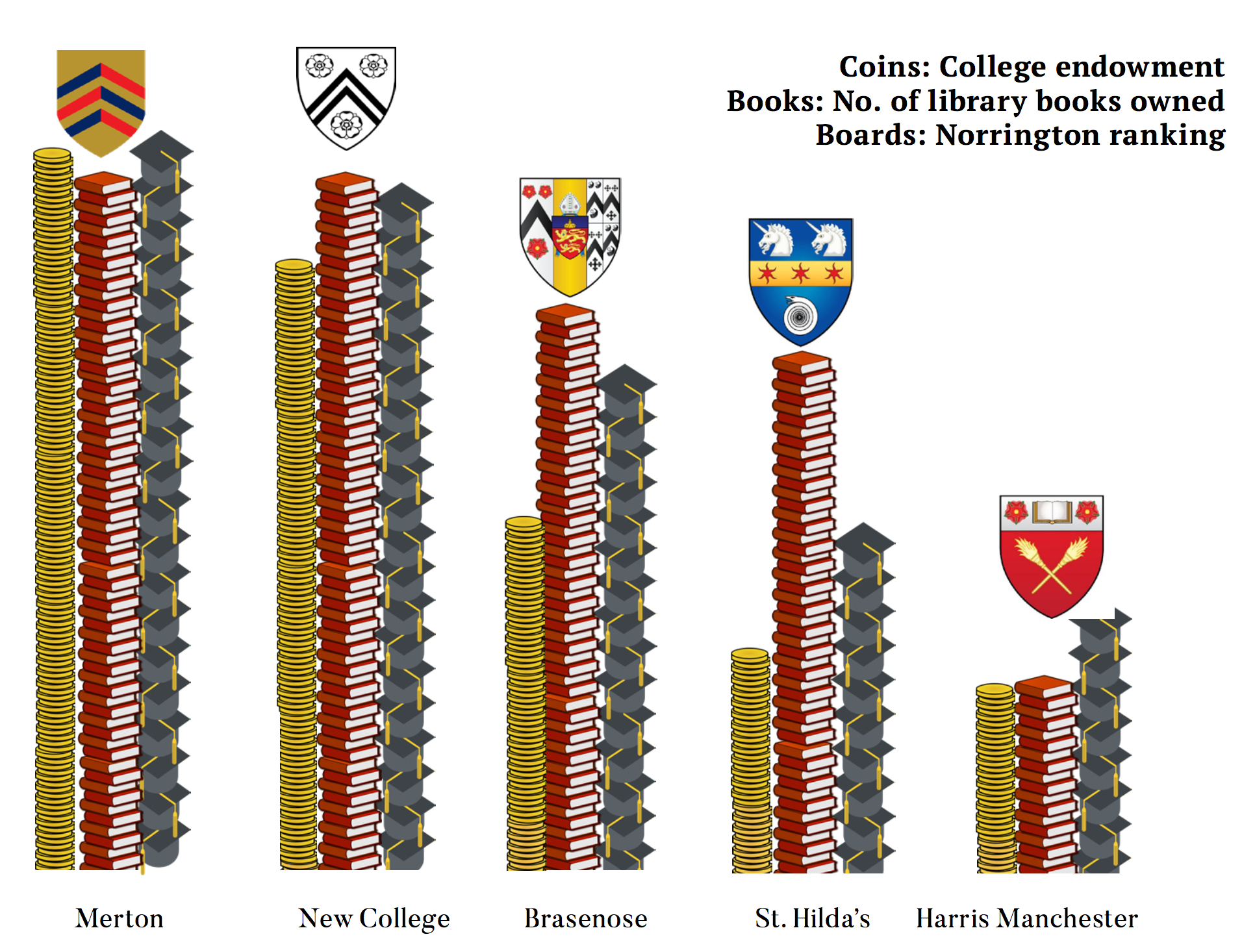The amount that colleges spend on their libraries is key to their academic performance, a Cherwell investigation has found.
Cherwell’s analysis shows the statistical correlation between access to reading material and Norrington Table performance. New data on 15 undergraduate college libraries, obtained by Cherwell through Freedom of Information requests, sheds light on the role of college wealth in the undergraduate student experience. The libraries of colleges that ranked higher on the league table tended to be larger and have more books.
The data also shows that library size is largely determined by the size of a college’s assets, which varies from £329 million for New College to just £24.8 million for Harris Manchester. This range was reflected in college library budgets for new material, which ranged from an annual average of £20,000 for Merton to just £4,700 for Mansfield.
Three out of the top five highest budgeted libraries (Merton, New College and Magdalen), ranked in the top 10 of all wealthiest Oxford colleges, while three of the five lowest budgeted libraries (St.Hugh’s, Harris Manchester and Mansfield) belonged to colleges in the bottom 10 in terms of endowment size.
This is despite the less wealthy Oxford colleges spending a far higher proportion of their assets on their library budget for new material, with New College’s library taking in just 0.4% of its endowment annually compared 3.3% for Harris Manchester.
Four of the top five colleges in library budgets (Merton, Magdalen, New and Balliol) rank among the top five in Norrington table score averages from 2006-2017. Likewise, four of the five colleges with smallest library budgets (Exeter, St. Hugh’s, Mansfield and Harris Manchester), ranked in the bottom ten of Norrington table scores.

These revelations come amidst other rising questions about the relationship between college wealth and student experiences. A Cherwell investigation last term demonstrated how wealthier colleges are able to expand their endowments much more rapidly and the impacts upon academic and admissions standards.
In 2002, an Oxford SU report demon- strated that students “are far from guar- anteed a common educational experience, with detriment not only to their academic performance but also to their general welfare and financial condition.”
Vice-President of Access and Academic Affairs Lucas Bertholdi-Saad told Cherwell: “We believe in an Oxford education where colleges are at the heart of the education and support each student receives, but where the college or hall to which a student belongs makes no difference to the quality of their education, including the quality of education resources.
“We also ask students to offer their feedback all year round and play an active part in shaping their learning experience.”
College libraries are a crucial resource to students, especially those studying humanities. While all course materials are available in the University-wide Bodleian libraries, these books are often occupied by other students on the same course. Central Bodleian libraries also tend to have more restrictive opening hours than college libraries.
Most college libraries have liberal policies on purchasing new material on request from students, but this process can be cumbersome. Students with access to more well-resourced libraries can therefore gain an advantage in the speed and breadth of their essays.
A spokesperson for the History Society told Cherwell: “The correlation found by Cherwell’s investigation is upsetting, but not surprising. The flexible opening times and accessibility of college libraries mean that to many students of text-heavy subjects like history a well stocked college library is crucial to producing high quality work.
“While for extended projects like theses the Bodleian Library is very useful, college libraries are often more convenient to use for weekly tutorial essays due to the former’s restrictive opening hours and rules about some materials remaining on site.
“As such, the quality of a college library is particularly important when, during the process of writing an essay late at night or shortly before a deadline, one discovers an urgent need for further, specific materials. While ideally a student should plan their time with this in mind, realistically, students with access to a well stocked college library fare better in these types of common situations.”
The fifteen colleges included in Cherwell’s investigation were Balliol, Brasenose, Corpus Christi, Exeter, Harris Manchester, Magdalen, Mansfield, Merton, New, St Anne’s, St. Catherine’s, St. Hilda’s, St. Hugh’s, University and Worcester. Other colleges had to be excluded due to issues with standardization of the data.


